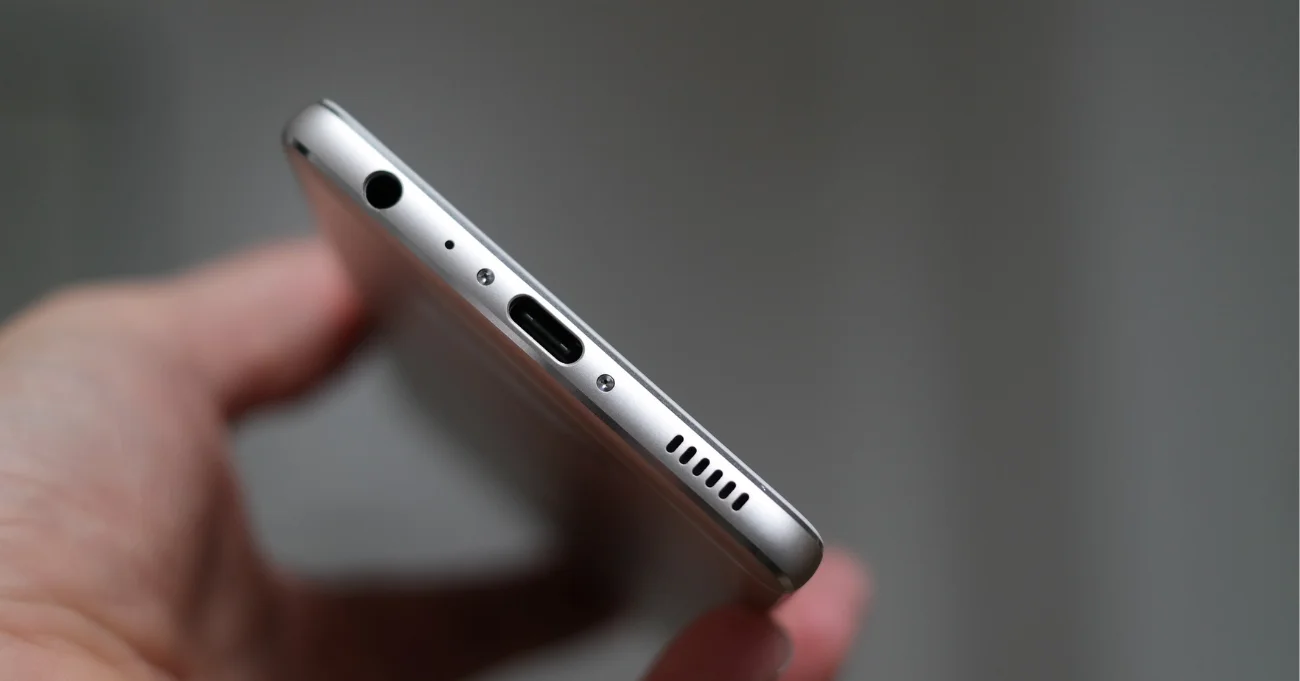Apple recently settled a class action lawsuit regarding a defect in the iPhone 7, commonly known as “Loop Disease.” This issue, caused by a malfunctioning audio chip, led many iPhone 7 and iPhone 7 Plus users to experience frustrating audio problems. Reports of failed calls, silent speakers, unresponsive Siri commands, and even device freezes mounted as users struggled with limited audio functionality. Initially, Apple dismissed these issues as isolated, but as more cases surfaced, dissatisfaction grew. This led to a smartphone class action lawsuit in 2019, seeking compensation for impacted users.
At Sparrow, we specialize in helping consumers navigate class action settlements and understand their options. Whether it’s pharmaceutical disputes like the NP Thyroid lawsuit or disputes involving well-known brands like the iFit lawsuit, we connect affected consumers to resources and make the process of seeking compensation simple and accessible. With Sparrow, you’ll find support for understanding and pursuing your rights in cases like Apple’s iPhone 7 settlement.
Drawing on our experience with class actions, we break down the details of Apple’s iPhone 7 settlement, including eligibility criteria and available support options. Discover the key information you need to make informed decisions and explore all avenues for resolution and compensation.
Background on the Audio Defects in iPhone 7 Models
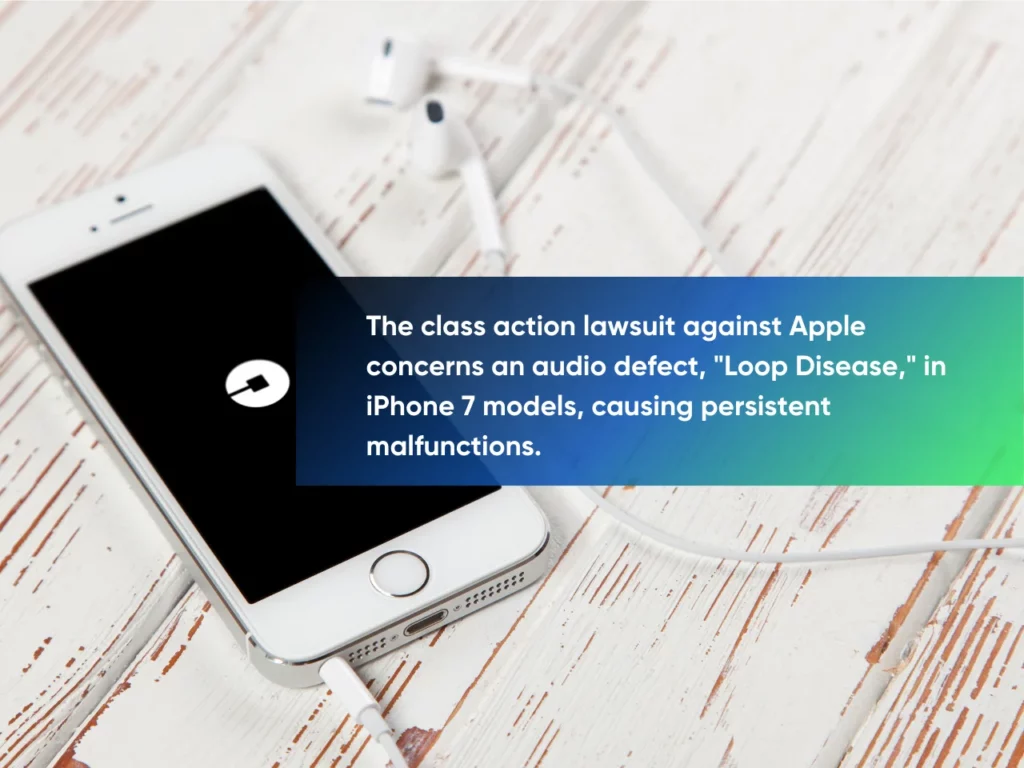
The smartphone class action lawsuit against Apple is centered around a reported audio defect in iPhone 7 models, commonly known as “Loop Disease.” This defect causes persistent malfunctions in the audio system, leading to frustration for users who rely on basic audio functions in their devices.
Loop Disease is tied to a flaw in the iPhone 7’s audio IC (integrated circuit) chip, which is critical for handling the phone’s audio functions. When this chip malfunctions, users may experience several debilitating issues, such as the inability to make calls, muffled or silent speakers, unresponsive Siri commands, and even device freezes when attempting to use audio features.
This defect often left users with limited device functionality, and many were forced to pay for costly repairs. For iPhone 7 owners between 2016 and 2023, these persistent audio problems were both inconvenient and frustrating, as they prevented the normal use of a product that was marketed for reliability.
Apple initially indicated that these malfunctions were isolated incidents rather than a widespread problem. However, as more reports surfaced and Loop Disease became a well-known issue, the calls for Apple to take responsibility grew louder. Apple’s lack of action in addressing the problem led to increased consumer dissatisfaction, with many iPhone 7 users finding themselves stuck with malfunctioning devices or high repair costs. This dissatisfaction ultimately led to the smartphone class action lawsuit filed in 2019, with the goal of seeking justice and compensation for affected users.
Details of the Class Action Lawsuit and Settlement
Apple has faced significant scrutiny regarding its handling of the audio defects in iPhone 7 models. The widespread reports of Loop Disease and Apple’s lack of response prompted many users to question the company’s commitment to product quality and transparency. This growing dissatisfaction culminated in a class action lawsuit to hold Apple accountable for allegedly selling defective devices without adequate disclosure or support for affected customers.
Allegations
The Apple class action lawsuit is founded on several critical allegations, primarily focusing on Apple’s alleged negligence and failure to inform consumers about the iPhone 7’s known audio issues. The central claims are as follows:
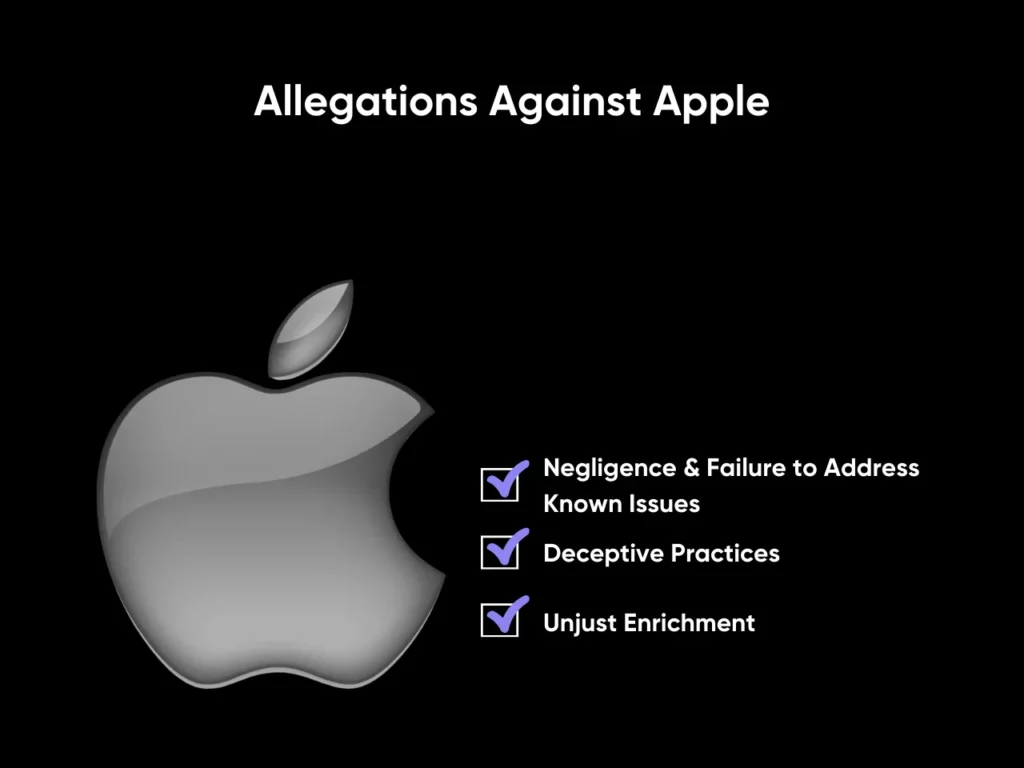
- Negligence and Failure to Address Known Issues: Plaintiffs allege that Apple knowingly sold iPhone 7 models with defective audio IC components. They argue that Apple’s awareness of the issue but failure to offer a free repair or recall program constitutes negligent business practice.
- Deceptive Practices: The smartphone class action lawsuit contends that Apple engaged in deceptive practices by continuing to sell devices with Loop Disease without informing customers. By failing to disclose the defect, Apple allegedly violated consumer protection laws and misled consumers about the product’s reliability.
- Unjust Enrichment: Plaintiffs claim that Apple profited from selling defective devices while denying or ignoring complaints, forcing users to pay for costly repairs or replacement devices. This alleged enrichment, they argue, came at the expense of consumer trust and fairness.
These allegations form the foundation of the smartphone class action lawsuit, aiming to provide justice to users who were left with malfunctioning devices and repair costs due to Apple’s inaction.
Company’s Stand on the Case
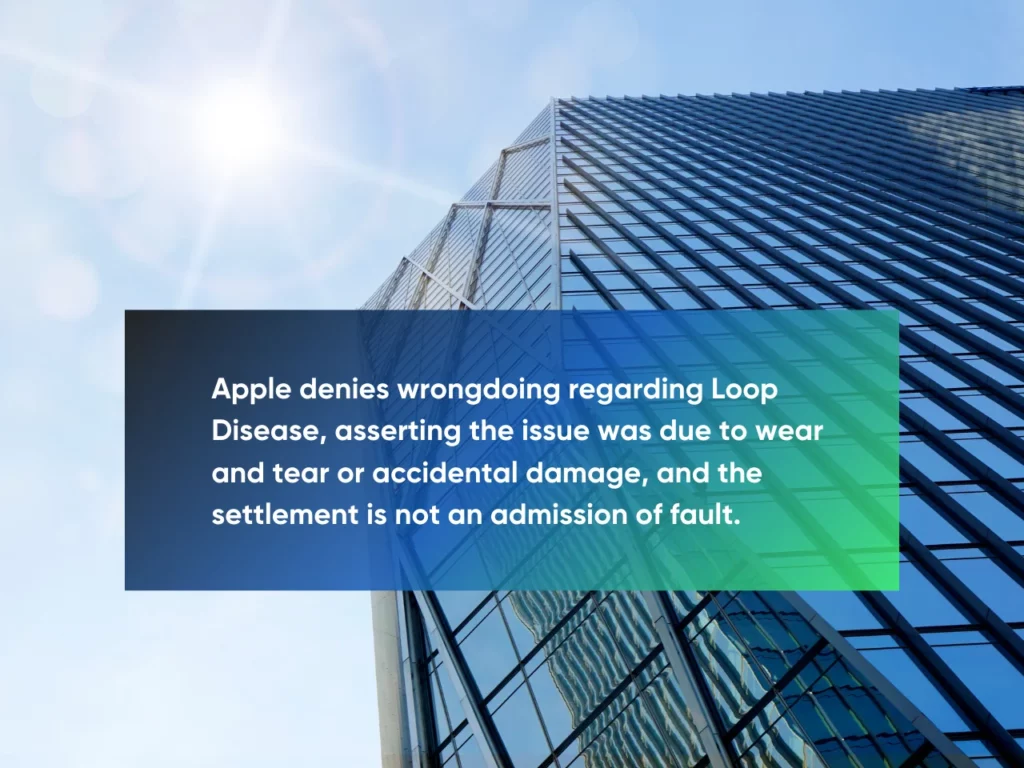
Apple has maintained that it did not knowingly sell defective devices and denies any wrongdoing in relation to Loop Disease. The company asserts that its devices met quality standards upon release and that any audio malfunctions reported by users were isolated incidents rather than indicative of a larger hardware flaw. Apple’s stance is that Loop Disease was not a design flaw but rather the result of regular wear and tear or accidental damage.
While Apple agreed to the settlement, the Apple iPhone 7 settlement is not an admission of fault. Apple continues to deny the claims but opted to resolve the lawsuit to avoid prolonged legal battles and address customer grievances more expeditiously. By settling, Apple hopes to provide compensation without the need to admit liability, a common approach for companies facing large-scale class actions.
Timeline of Action
The legal process for the smartphone class action lawsuit has taken several years to reach a settlement, with critical events spanning from the Apple lawsuit’s filing to the settlement’s final approval. Here is an outline of the timeline:
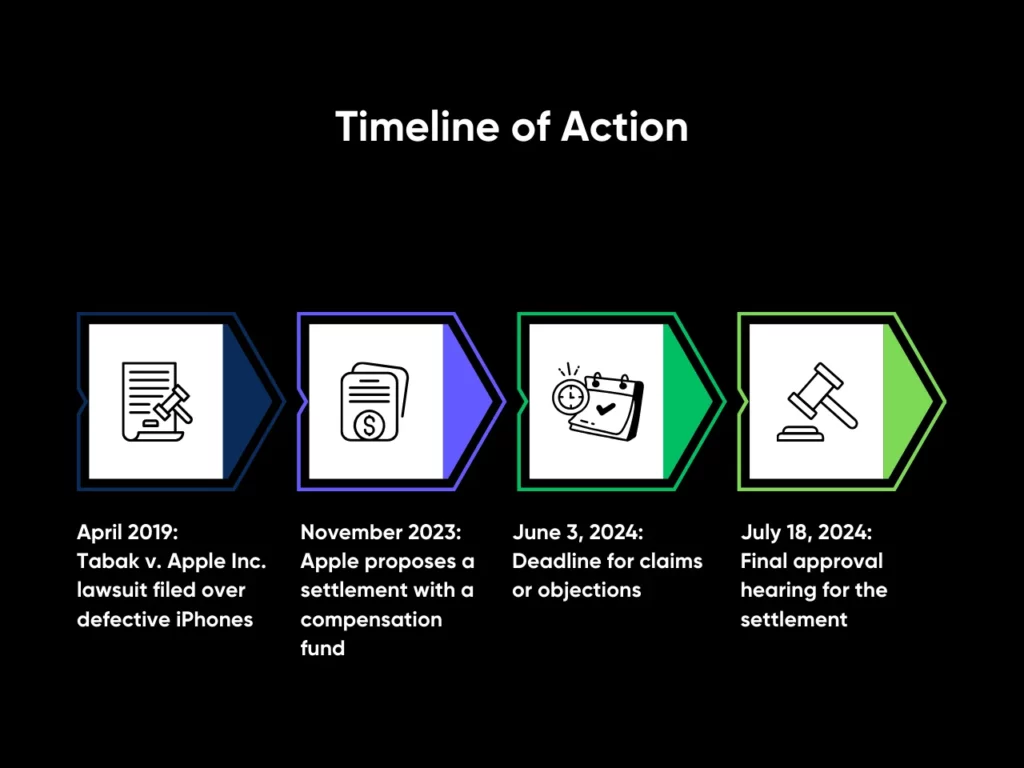
- April 2019: The lawsuit, titled Tabak v. Apple Inc., is filed in the United States District Court for the Northern District of California by the affected group of consumers, accusing Apple of knowingly selling defective devices and concealing information about the audio issue.
- November 2023: Apple and the members of the class reach a proposed settlement agreement, with Apple agreeing to establish a compensation fund for affected users.
- June 3, 2024: Deadline for users to file claims, opt out, or object to the settlement terms.
- July 18, 2024: Final approval hearing is scheduled, during which the court will decide if the settlement terms are fair and reasonable. If approved, the settlement will move forward, and payments to claimants will begin shortly after.
This timeline demonstrates the complex and lengthy nature of corporate class action lawsuits and the importance of consumer advocacy in reaching resolutions.
What Affected Users Need to Know
The deadline to file claims for the Apple smartphone class action lawsuit settlement has passed, meaning no new claims can be submitted. With a total settlement fund of $35 million, this lawsuit aimed to provide financial compensation to eligible iPhone 7 and iPhone 7 Plus users who reported or paid for repairs due to audio issues.
For those who missed the filing deadline but are still experiencing audio issues with their iPhone 7, there are still options to consider:
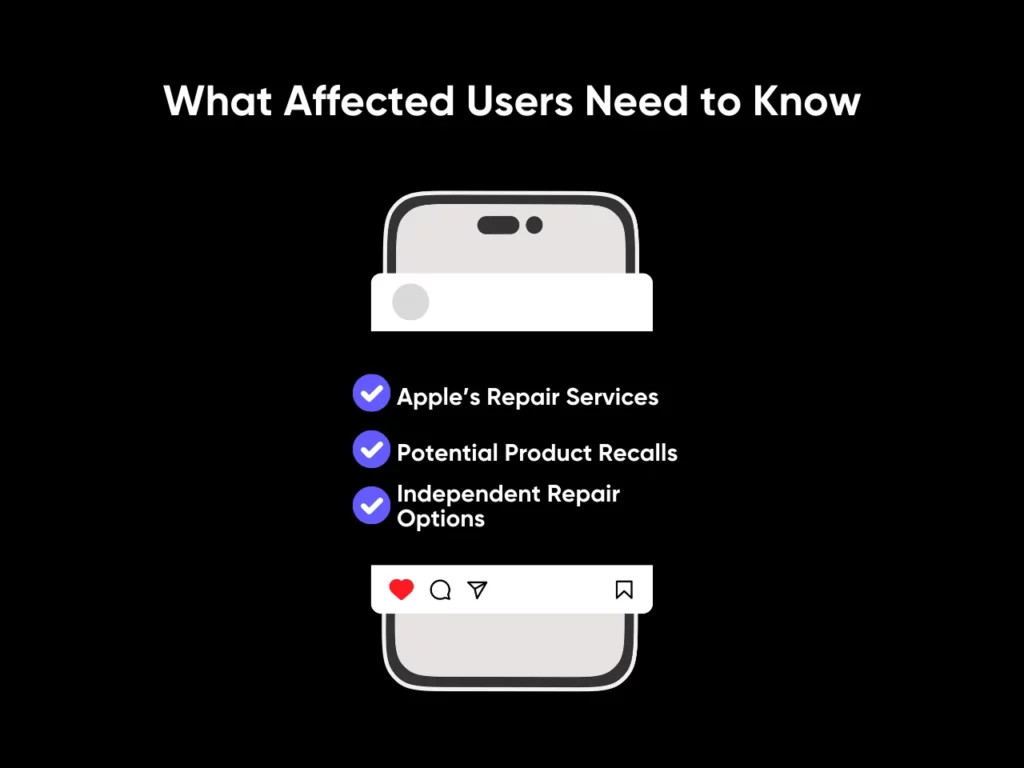
- Apple’s Repair Services: Apple may offer repair services for devices experiencing known hardware issues, even after the warranty period. Contact Apple Support or visit an Apple Store to inquire if any repair programs are available for iPhone 7 audio problems.
- Potential Product Recalls: While no formal recall has been issued for iPhone 7 audio defects, Apple occasionally provides repair or replacement programs for specific defects. Checking the Apple Support website for updates can help you stay informed about any potential repair opportunities that could address Loop Disease.
- Independent Repair Options: If your device is no longer eligible for Apple’s repair services, consider seeking assistance from certified third-party repair providers. Many independent shops specialize in Apple device repairs and may offer cost-effective solutions for audio issues.
Though the settlement deadline has passed, staying updated on repair options and potential recalls can provide alternative routes to address ongoing audio problems with your device.
Settlement Details
The Apple iPhone 7 settlement fund was established to compensate affected users who experienced diminished performance in their smartphones before December 2017 and incurred costs due to the audio defect. With a total fund of $35 million, the settlement provided several compensation tiers based on each claimant’s circumstances.
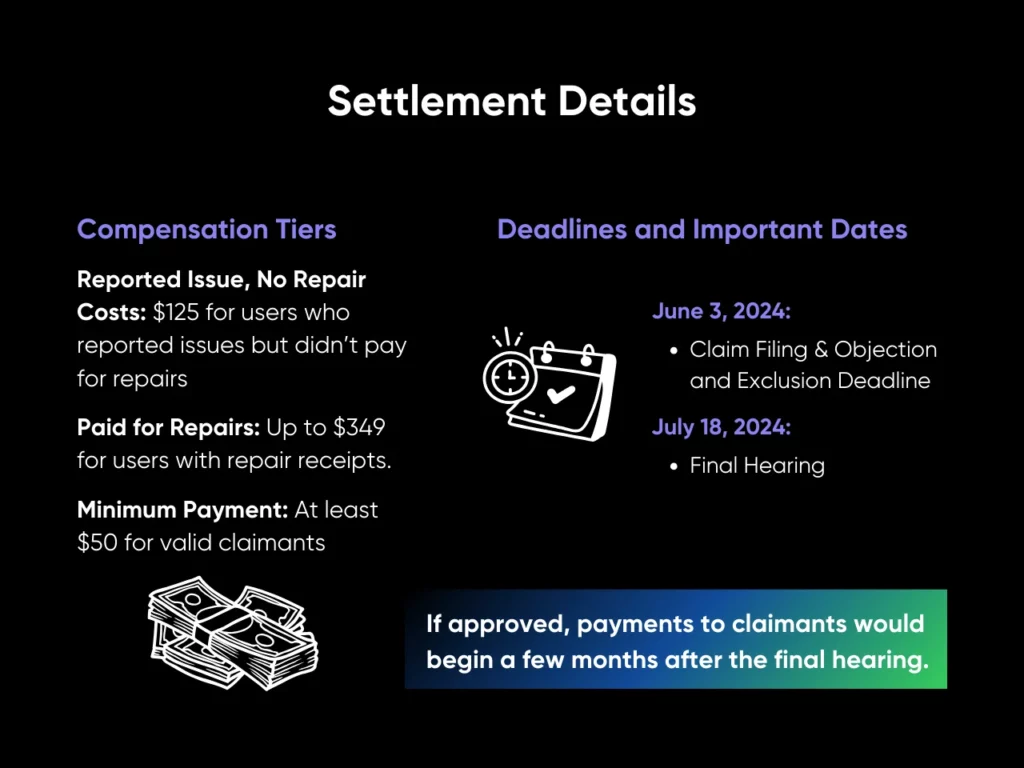
Compensation Tiers
- Reported Issue, No Repair Costs: Users who reported audio issues to Apple but did not pay for repairs were eligible for $125.
- Paid for Repairs: Users who incurred repair expenses related to Loop Disease could receive up to $349, depending on the amount spent and the supporting documentation they provided.
- Minimum Payment: A minimum compensation of $50 was provided to eligible claimants who filed valid claims, even if they did not report the defect or pay for repairs.
Deadlines and Important Dates
Several key deadlines and events were established to ensure claimants received compensation through the Apple iPhone 7 settlement. Meeting these deadlines was crucial for users to qualify for compensation or raise any concerns about the settlement terms.
- Claim Filing Deadline: June 3, 2024.
- Objection and Exclusion Deadline: Also on June 3, 2024, users will be allowed to opt out of the settlement or object to its terms.
- Final Hearing: Scheduled for July 18, 2024, this hearing was set for the court to review the fairness of the settlement.
Expected Timeline for Payouts
If the court approved the smartphone class action lawsuit settlement terms at the final hearing, payments to eligible claimants were expected to begin within a few months afterward. Those who filed successfully would receive updates from the settlement administrator regarding the exact payout date. For additional assistance, users could contact the settlement support center listed on the official settlement website.
This structure allowed claimants to receive compensation appropriate to their experiences with the audio defect and ensured that affected users were fairly compensated for the inconveniences they faced.
Key Takeaway
Apple’s “Loop Disease” settlement over iPhone 7 defects is a stark reminder of what happens when tech fails to meet consumer expectations. This smartphone class action lawsuit, initiated due to audio malfunctions affecting calls, Siri, and other core functions, shines a light on Apple’s reluctance to address widespread defects until legal action forced a resolution.
Customer dissatisfaction has also become more palpable as Apple faces several lawsuits involving their Apple watch, Apple digital wallets, and alleged violations of the Sherman Act, also known as the federal antitrust law. The U.S. Justice Department and state and district attorneys general have initiated a civil antitrust lawsuit to curb Apple’s monopolization of smartphone markets and to root out possible anti-competitive practices of the iOS giant, which results in higher prices and higher fees for apps and products to the detriment of consumers.
If you’re interested in staying updated on similar cases, Sparrow can help. We track class action settlements, connect affected consumers with resources, and offer guidance on navigating claims. Follow Sparrow’s blog to stay informed on the latest class actions and learn more about protecting your rights as a consumer.
